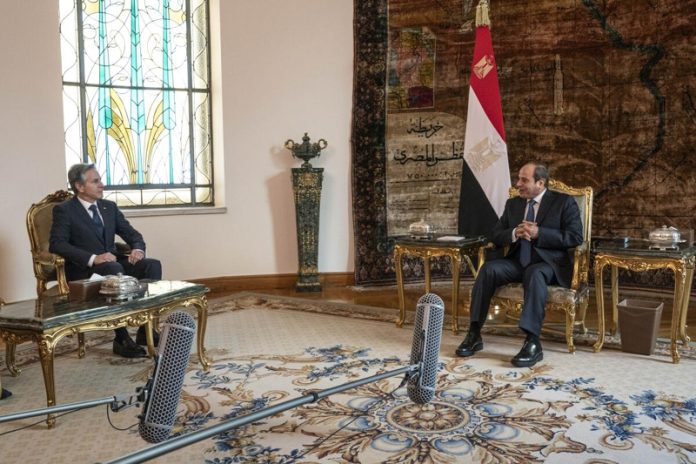CAIRO, Oct 15: US Secretary of State Antony Blinken will return to Israel this week after completing a frantic six-country rush through Arab nations aimed at preventing the Israel-Hamas war from igniting a broader regional conflict.
The US State Department announced Blinken’s plan to travel Monday to Israel — his second visit in five days — as America’s top diplomat arrived in Cairo for talks Sunday with Egypt’s president, Abdel Fattah el-Sissi.
It was the last of Blinken’s meetings with Arab leaders amid increasing fears that an impending Israeli ground offensive into Gaza could spark a wider war with devastating humanitarian consequences.
During his meeting with Blinken, el-Sissi said Israel’s Gaza operation has exceeded “the right of self-defence” and turned into “a collective punishment,” according to Egypt’s state-run media.
It was the strong public pushback that Blinken has heard from the seven Arab leaders with whom he has met on the trip.
Department spokesman Matthew Miller told reporters travelling with Blinken that the secretary was returning to Tel Aviv “for further consultations with Israeli officials.” Miller did not elaborate.
Before landing in Egypt, Blinken met on Sunday morning with Saudi Crown Prince Mohammed bin Salman in Riyadh.
That meeting followed talks over the previous three days with the leaders of the United Arab Emirates, Bahrain, Qatar, Jordan and the Palestinian Authority.
Blinken began the whirlwind trip on Thursday in Israel, pledging support and solidarity for the country as it responds to last week’s Hamas surprise attacks.
Blinken also spoke by phone with Chinese Foreign Minister Wang Yi to seek Beijing’s support in discouraging others from getting involved.
Yet as plans for Israel’s military action to eradicate Hamas have taken shape with heavy airstrikes and warnings for more than a million Palestinians to evacuate the northern Gaza Strip, concerns for a broader conflict have intensified.
In his talks with Arab leaders Blinken has stressed the importance of not allowing that to happen.
In Washington, Biden’s national security adviser said the US was not “making requests or demands of Israel with respect to its military operations.”
Jake Sullivan, making the rounds of the Sunday TV news shows, said the Biden administration was “simply stating our basic principles – the principles upon which this country is based and all democracies, including Israel, are based.
It’s what makes us different from the terrorists, that in fact we respect civilian life.”
He said the US was not “not interfering in their military planning or trying to give them instructions or requests specific.”
The naval presence is intended to serve as a deterrent to other countries and groups, like Iran and Syria and Lebanon’s Hezbollah, not to enter the conflict.
Also Saturday, as the Israeli military said its assault against Hamas targets in Gaza would begin very soon, President Joe Biden spoke by phone with Israeli Prime Minister Benjamin Netanyahu and Palestinian President Mahmoud Abbas.
US officials have said the Arab reaction to Blinken’s message has been generally positive — acknowledging Israel has a right to respond to the Hamas attacks but expressing deep concern about the humanitarian situation in Gaza and unable to stay silent about the Palestinian civilian casualties that result.
The Arab leaders have also said the current situation cannot be resolved without an Israeli-Palestinian peace deal that gives the Palestinians an independent state.
In his roughly hourlong meeting with Prince Mohammed at the de facto Saudi leader’s private farm outside Riyadh, Blinken “highlighted the United States’ unwavering focus on halting terrorist attacks by Hamas, securing the release of all hostages, and preventing the conflict from spreading,” the State Department said.
“The two affirmed their shared commitment to protecting civilians and to advancing stability across the Middle East and beyond,” according to a department statement.
The normalisation talks are now on hold, a result that US and other officials believe was a main goal of Hamas and its prime sponsor, Iran.
Neither the US nor Saudi statements mentioned the matter. (AP)


